AI-Powered Hotel Management Systems: The Game-Changing Frontier of 2025
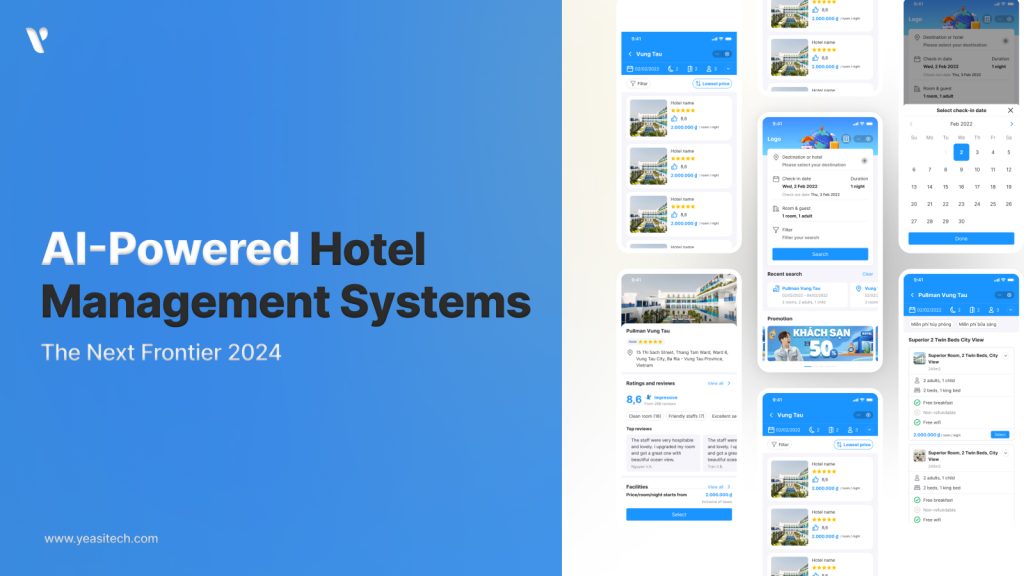
In 2025, technology is changing many industries, and hotels are no different. AI-powered hotel management systems are becoming a game changer, offering new ways for hotels to run their operations and improve guest experiences.
This blog looks at how these AI systems are developing, their benefits, and why they are seen as the future of hotel management.
Robotic concierges have been used by numerous hotels since 2014 to help its visitors. The Hilton robot Connie, which is driven by IBM’s Watson supercomputer, is at the forefront of this trend. Cleo and Leo at Hotel EMC2, Yobot at Yotel Hotels, and ALO at Aloft Hotels are other hotel robots.
These robots are still being used in small numbers, so we can’t really measure how effective they are yet. But one thing is clear they’re generating a lot of excitement for their brands.
The International Data Collection has predicted that in the coming years, 70% of travel agencies and 60% of hotels will start using AI technology, which will greatly change the hospitality industry. While this may seem unlikely to some, a Gartner survey backs this up by showing that global AI usage has increased by an impressive 270%.
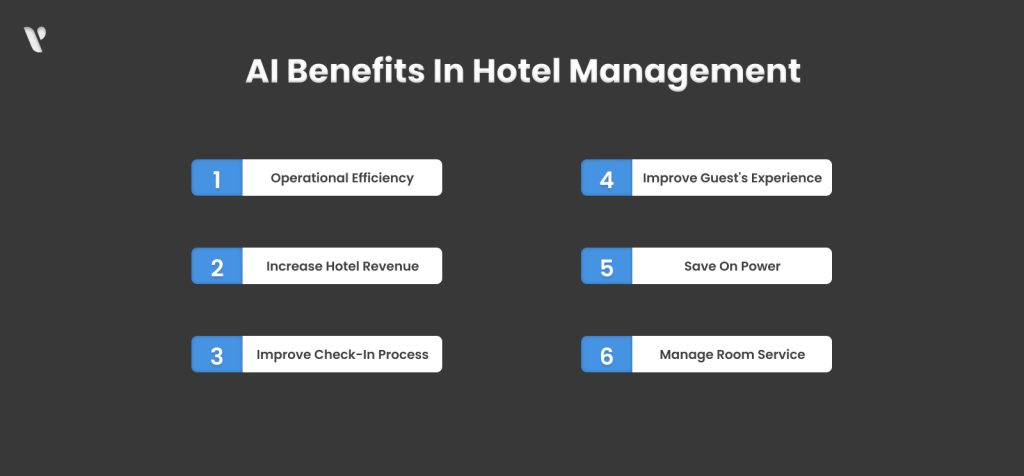
Many hotel industries are using AI to improve their operations, but is it the right choice for your hotel? Here are some key ways artificial intelligence could help you grow your business.
AI handles tedious and time-consuming tasks, allowing your staff to focus on less important and visitor-focused tasks. These artificial intelligence (AI) technologies manage inventories, take reservations, and even identify when maintenance is necessary to keep things running properly. In spite of lowering expenses, this increases the visitor experience by offering quicker and more precise services.
AI supports you in determining room rates that vary according to market trends and demand. In this manner, you may provide the greatest pricing for each accommodation and maximize revenue. You can also make customized advertisements with AI-powered marketing tools, which may result in more direct reservations and more overall income.
AI has endless possibilities to improve service in the hospitality industry. For example, if AI can quickly connect with your mobile phone or use facial recognition, you won’t need to show ID or check in formally. With a mobile room key, guests can go straight to their rooms without any delay.
AI enables you to give your visitors incredibly customized experiences. AI may predict visitor preferences by analyzing visitor data and modifying services accordingly. This could mean setting up rooms just the way they prefer, offering custom dining and activity suggestions, and delivering services at the right time. This kind of customization care can greatly boost guest satisfaction, and loyalty, and encourage them to return.
Smart technology will boost hotel profits by detecting which lights and appliances are in use and automatically turning off those that aren’t, helping save energy.
You won’t need to call or wait for someone to take your order; AI lets guests communicate instantly. Food and drinks can even be delivered by AI bots. AI systems will be very good at keeping to schedules and maintaining high standards for cleaning and getting ready for guests.
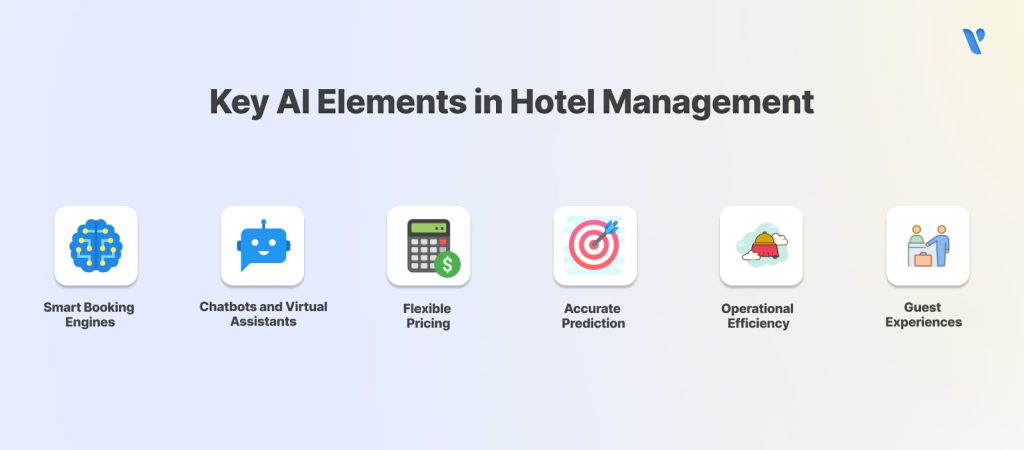
Modern technology is being used by AI-powered hotel management systems to simplify operations while improving visitor experiences, revolutionizing the hospitality sector.
By providing customized recommendations based on past information and preferences, AI-driven booking engines improve the visitor booking experience. These algorithms use information about past visits and booking patterns to suggest accommodations, deals, or packages that align with the preferences of the user. As a result, booking rates rise and income from upselling and cross-selling rises as well.
Chatbots and virtual assistants offer real-time customer service. Using natural language processing, they handle reservations, questions, and in-room assistance, providing immediate help and allowing human workers to handle more difficult jobs.
Real-time adjustments to accommodation prices are made by AI-driven dynamic pricing technologies in response to market trends, competition, and demand. To optimize pricing and maximize income, they evaluate data such as historical pricing, local events, and booking trends. This helps hotels maintain their profitability even in the face of market fluctuations.
AI is used by predictive analytics systems to forecast behaviors and trends. This entails anticipating visitor preferences, occupancy, and possible problems for hotels. Hotels might improve operations along with customer happiness by using data and trend analysis to make well-informed decisions on staffing, inventory, and marketing.
AI improves inventory, maintenance, and cleaning processes, which in turn simplifies hotel management systems. It reduces cleaning schedules, automates inventory monitoring, and estimates maintenance needs, all of which save costs and increase the quality of service.
AI allows hotels to customize guest experiences by analyzing data like preferences, past interactions, and social media activity. This enables custom services, including custom room settings, local attraction recommendations, and targeted marketing.
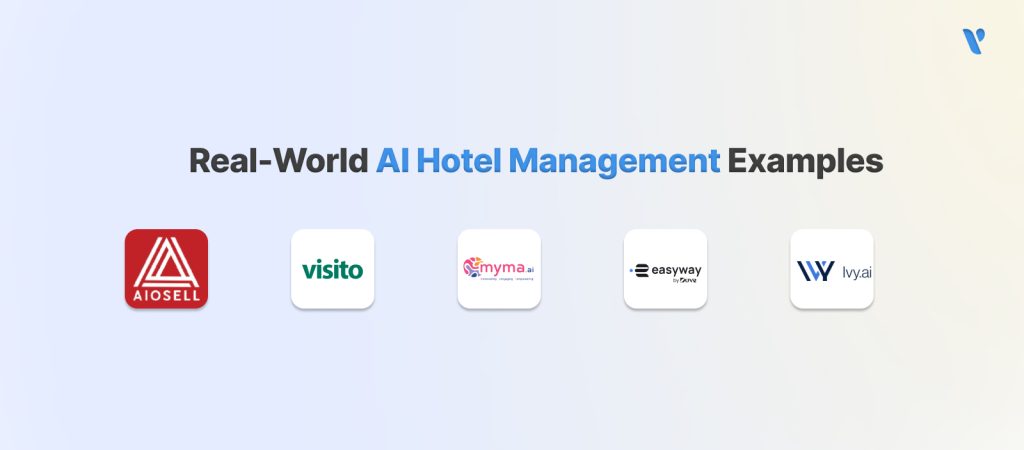
Here, we look at real-life examples of how artificial intelligence is being applied to hotels to transform the sector:
Aiosell provides a computerized revenue management system for hotels that helps set and adjust room rates automatically. It uses artificial intelligence to change prices based on supply, demand, and competition and works around the clock to boost profits.
Aiosell works with different hotel software, like SiteMinder, to offer a complete solution. This includes property management, channel management, booking engines, reviews management, and more.
Visito‘s AI-driven solution automates 97% of communications and reduces support expenses by up to 90% in the hotel industry by connecting with WhatsApp, Instagram, and Messenger.
The system promotes direct bookings by showing room pricing and availability in apps and sending smart follow-ups. Visito employs AI, including OpenAI ChatGPT and Google Gemini, to improve guest experiences and increase positive reviews.
An AI-powered platform called Myma.ai was created to improve visitor experiences and simplify business processes in the hospitality sector. From initial bookings and questions to post-stay follow-up, it covers it all.
The platform links to several sources of communication, including social media, messaging apps, and websites. It makes use of AI to provide insightful information, automate responses, and offer personalized services.
EasyWay provides a complete AI-powered platform for the hospitality industry. It promotes guest connection with AI reservation agents, provides customized interactions, and increases the effectiveness of hotel management systems.
AI Concierge, AI Reservation Manager, and AI Receptionist are important features that manage check-ins, reservations, and guest inquiries in more than 100 languages, guaranteeing 24/7 support and error-free performance. EasyWay helps improve efficiency and guest satisfaction.
Ivy is a tool used by many big hotel brands that automates guest interactions. Made just for the hospitality industry, Ivy takes care of about 90% of real-time requests and acts as the main contact throughout the hotel stay. If Ivy can’t answer a question, she quickly directs it to the right department.
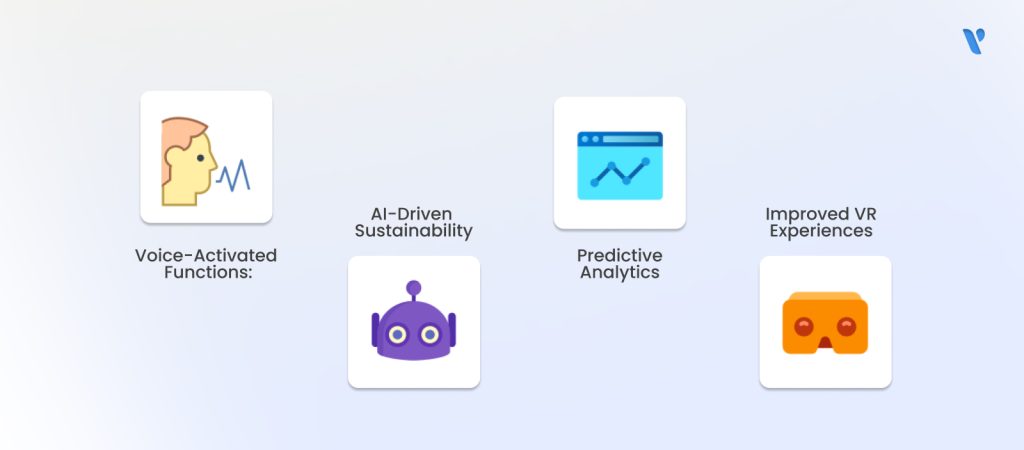
The future of hotel management systems is projected to be shaped by several factors as AI technology develops:
Using AI in your hotel management systems might feel overwhelming at first, but with a few key tips, you can make the transition and use of AI in your operations much easier.
The high expense and complexity of implementing AI technologies are frequent challenges for medium-sized hotels. AI system setup and management might be challenging without sufficient technical expertise. Hotels should use low-cost, user-friendly AI solutions that require little technical expertise to address these problems.
To reduce disruption and control costs, think about rolling out AI in stages. Begin with small AI projects that tackle specific issues, then slowly expand their use in different parts of your operations. This step-by-step method will help you, your team, and your guests become more comfortable and skilled with AI technologies.
When choosing AI solutions, pick software that can grow with your needs and is suited for medium-sized operations. Find AI tools that work well with your current hotel management systems and offer good support and training. This helps ensure a smooth transition and makes the most of your AI investment.
AI-powered hotel management systems will be at the forefront of the hospitality sector by 2025. Hotels may use these new developments for better guest experiences, raise operational efficiency, and remain competitive in a changing business.
Hotel management will change significantly in the future as a result of the integration of these technologies as AI develops. Keep up with the times and investigate how AI-powered solutions might improve guest relations and hotel operations.
Explore more about how Travel & Hospitality Software is Developed. Share your experiences or questions in the comments below, or reach out to us to learn more!

An AI-powered hotel management system uses artificial intelligence to enhance various aspects of hotel operations, including guest personalization, demand forecasting, automated check-in/check-out, and operational efficiency.
Improved revenue management, improved guest satisfaction, scalability, data-driven decision-making, and better operational efficiency are among the advantages. AI lowers expenses, maximizes resources, and improves overall service quality.
AI improves guest experiences by customizing services based on past preferences, automating room settings, and offering 24/7 support with chatbots. It personalizes stays to meet individual needs, making visits more enjoyable and memorable.
Yes, AI-powered systems can be scaled and adjusted for hotels of any size, whether they’re small boutique hotels or big international chains. They can be customized to fit specific needs and can grow with the business.
YeasiTech is a trusted IT service partner with 8+ years of experience, empowering 250+ businesses with scalable web, mobile and AI solutions.
Explore related topics to broaden your understanding and gain actionable insights that can transform your strategies.